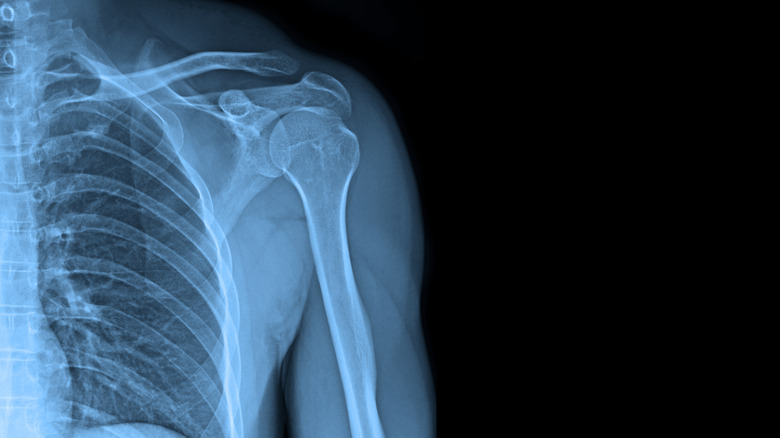Has Anyone Been Struck By Space Debris?
We've been sending objects up into space since 1957, and in those seven decades, everything we've sent up there has met one of three fates: Some are still functional, some have become space debris (or space junk), and the rest have crashed back to Earth. But here's the thing: eventually everything that we've sent into the cosmos (that still remains in Earth orbit, that is) is going to meet that last fate and fall back to Earth.
Fortunately, there are a few fail-safes in place for when space debris falls back home. For example, the Earth's atmosphere does a good job of burning up much of what enters it (naturally occurring space detritus as well as human-made space junk), and whatever does survive the atmosphere has a three-in-four chance of landing in the ocean since 70% of the Earth is covered by them, per the National Ocean Service. And finally, with some space objects, their managers are able to guide them down so that they intentionally land in the ocean.
But what if a bit of space junk manages to survive the journey through the atmosphere and, against all odds, lands in a populated area? It's happened at least once, according to Wired, and considering that there are tens of thousands of random bits of space debris floating around up there, it's likely to happen again.
Lottie Williams: The Only Human Known To Have Been Struck By Space Debris
On January 22, 1997, a 48-year-old woman named Lottie Williams was out for an early-morning walk through a Tulsa park when, according to ABC News, she saw a streak of light flash across the sky. " ... It was coming over the park and as it approached us it got bigger. All the colors that you see that come from fire, all those colors were there. It was like this big huge ball of fire, across this park," she said.
What she was actually witnessing, according to Wired, was fragments of a second-stage Delta rocket that had been launched into orbit months earlier and was making its way back. The U.S. Space Command would later confirm that the machine had reentered the atmosphere that day, and indeed, sightings of the re-entry were confirmed in bordering states Missouri, Arkansas, Texas, and Kansas.
A while after witnessing the lights in the sky, Lottie felt something lightly strike her shoulder, as if she were being tapped. Only it wasn't a friend tapping her: it was a six-inch-long piece of metal, black on the edges. Fortunately, due to it being a light metal, and favorable wind currents that day, the object was moving relatively slowly and left Lottie without so much as a bruise. As of May 2022, she is the only human known to have been struck by human-made space debris.
Space Debris Is Raining Down All Around Us
That only one known person in seven decades has been struck by space debris is probably impressive, considering that, as Wired reports, 5,400 tons of the stuff are known to have survived reentry over a 40-year period. Of course, the odds of being struck still remain vanishingly small.
That's of little comfort to inhabitants of parts of the Pacific Ocean, reports ABC News. Back in 2001, when it became apparent that Russia's MIR Space Station was headed home for good, residents around parts of the South Pacific were concerned that parts of it could land around various populated islands. Of course, as Space reports, the craft was safely and successfully brought down in the South Pacific Ocean, and there were no reports of humans being struck by any pieces.
A few decades early, however, another space station crashed back to Earth, and bits of it did manage to land in a populated area. Sort of. When Skylab was sent home in 1979, according to Wired, its managers guided it to a spot in the eastern Indian Ocean. Still, parts of it did manage to land in the sparsely-populated regions of Western Australia. One Aussie lad, 17-year-old Stan Thornton, found a piece and raced to get it to San Francisco, where a local newspaper was offering a $10,000 reward — nearly $40,000 today when adjusted for inflation — for the first piece of the craft to be brought to its headquarters. He did, in fact, take home the money.


